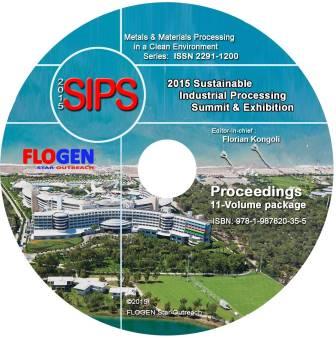2015-Sustainable Industrial Processing Summit
SIPS 2015 Volume 4: Meech Intl. Symp. / Mining Operations
| Editors: | Kongoli F, Veiga MM, Anderson C |
| Publisher: | Flogen Star OUTREACH |
| Publication date: | 23 December 2015 |
| Pages: | 275 pages |
| ISBN: | 978-1-987820-27-0 |
| ISSN: | 2291-1227 (Metals and Materials Processing in a Clean Environment Series) |

< CD shopping page
The strategic plan for INCAM: The Indonesian Centre for Artisanal Mining
Dadan Nurjaman1; Yudi Prabangkara2; Christopher Anderson3; Ruby Stocklin Weinberg4; ABDUL HARIS5;1AGENCY FOR THE ASSESSMENT AND APLICATION OF TECHNOLOGY, Jakarta, Indonesia; 2ASSISTANT DEPUTY FOR MINING AND ENERGY INFRASTRUCTURE, THE COORDINATING MINISTRY FOR MARITIME AFFAIRS, Jakarta, Indonesia; 3MASSEY UNIVERSITY, Palmerston North, New Zealand; 4MILLER-PREISWERK, Vancouver, Canada; 5HEAD OF MINE ENVIRONMENT TECHNOLOGY, AGENCY FOR THE ASSESSMENT AND APPLICATION OF TECHNOLOGY, JAKARTA, Indonesia;
Type of Paper: Regular
Id Paper: 544
Topic: 4
Abstract:
Indonesia has a long mining history; mineral resources have been mined across the country since the 16th century, before the colonial period. Location on a plate boundary makes Indonesia a rich host for mineralisation. Artisanal gold mining is a consequence of this rich mineralisation. Artisanal miners began working visible gold in alluvial deposits hundreds of years ago using simple separation technology. Today tens-of-thousands of miners extract fine gold from primary ore deposits using a range of techniques. As the technology became known, miners embraced mercury amalgamation and this technique has become widely used, regardless of the type of ore, due to its simplicity and versatility. However, amalgamation can be very inefficient, and the mercury can cause detrimental effects to public health and the environment. Mercury is a pervasive and insidious trans-boundary contaminant.
Artisanal mining has also brought about occupational hazards and a range of social problems in mining areas. Human safety, traditional livelihoods and community values are being eroded by the pursuit for gold. A continued and focused effort is therefore required to increase the technical capability of the artisanal and small-scale miners to enhance the sustainability of mining. Capability building is required to promote better and safer mining and processing of gold ore, as well as to protect the environment. Such effort is desperately needed to reduce social tensions and to protect future generations.
The Indonesian government has realised that artisanal and small-scale mining is a part of society. Artisanal mining is therefore included in the Mineral and Coal Law No. 4/2009. The government is also a signatory to the Minamata Convention to phase out mercury use (October 2013). These two instruments are being used to regulate artisanal mining and to establish this activity as a formal part of the extractive industries. BPPT is a key stakeholder in the government’s National Implementation Plan to phase out mercury use in the artisanal mining sector. BPPT has taken a lead in establishing the Indonesian Centre for Artisanal Mining (INCAM) which will contribute to the government’s agenda through technology innovation and the education of miners. INCAM is expected to become a national node for Indonesian and international expertise working to secure a better future for the artisanal and small-scale mining sector. INCAM has the potential to harmonise national and international efforts in this space.
Keywords: Indonesia; artisanal and small scale gold mining; Minamata Convention; mercury, National Implementation Plan